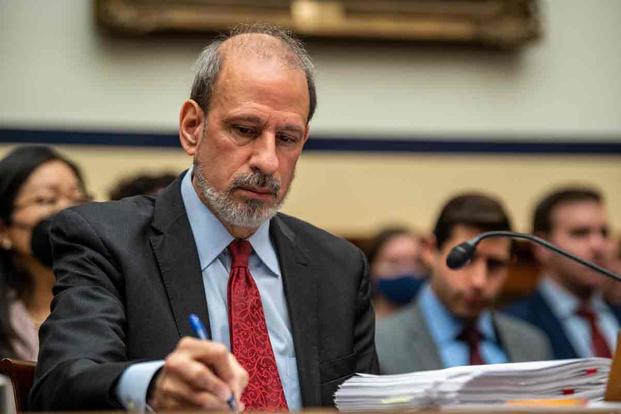Service members and their families could be harmed by budget cuts if the Defense Department is forced to revert to 2022 funding levels, a department official wrote in a letter to Congress released Monday.
"Reductions of this magnitude would certainly force severe disruptions to our people, especially because we would still need to fund the pay raises our people deserve and to avoid involuntary separations," Pentagon comptroller Michael McCord wrote. "This would shift the burden of these cuts toward our training, readiness and recruiting, damaging our cohesion and our ability to respond on the nation's behalf."
The letter was solicited and released by Democrats on the House Appropriations Committee as they gear up to battle House Republican efforts to cut the overall federal budget by about $130 billion.
Read Next: Army Private's Death and Claims of Harassment Again Shine Spotlight on Fort Hood
In January, Appropriations Committee ranking member Rep. Rosa DeLauro, D-Conn., asked executive branch agencies to detail the effects of budget cuts after House Speaker Kevin McCarthy, R-Calif., vowed to slash overall government funding to 2022 levels as part of a deal to get enough votes to become speaker. DeLauro is releasing agencies' responses to her just before administration officials start testifying about the fiscal 2024 budget to the Appropriations Committee, including a scheduled appearance Thursday by Defense Secretary Lloyd Austin, Joint Chiefs of Staff Chairman Gen. Mark Milley, and McCord.
The budget fight is heating up after the Biden administration earlier this month released its $1.7 trillion budget plan for fiscal 2024, including $842 billion for the Pentagon.
While some Republicans have insisted the defense budget could be spared from cuts if nondefense spending is slashed, others have said unspecified "woke" spending at the Pentagon should be eliminated. GOP defense hawks, meanwhile, are arguing the Biden administration's defense budget request for 2024 should be bulked up. Getting to 2022 spending levels while increasing defense or even maintaining a flat defense budget would mean billions in cuts to domestic programs, a nonstarter for Democrats who control the Senate and the White House.
Any defense cuts would be a reversal from the last two years in which Congress ladled billions more onto the Pentagon budget than the administration asked for.
"After two consecutive years in which Congress has increased the funding level above the levels we have requested, such an immediate about-face to deep cuts to the defense program the president and secretary believe we need would be extremely disruptive and inefficient, and would be certain to result in the waste of funding Congress has recently approved," McCord wrote in his letter.
If the Defense Department reverted to its 2022 funding level, that would mean $100 billion less than the proposal for 2024, McCord said.
The department is required by law to provide an annual pay raise to troops, though Congress has the power to reduce the raise or freeze pay.
For 2024, service members are slated to receive a 5.2% pay bump, which would be the largest raise in more than 20 years. Combined with the 4.6% raise troops got this year, personnel costs for 2024 are expected to be $10.3 billion more than they were in 2022, McCord said.
"The increased pay costs, plus the increased cost of FY2024 levels of Basic Allowance for Subsistence ($1.0 billion) and the Basic Allowance for Housing ($4.1 billion), are unavoidable and would all have to be offset by cuts in manning levels or training, driving us to a smaller, more overworked, less ready force," McCord wrote.
Protecting personnel accounts would mean significant cuts to weapons programs the Pentagon sees as integral to competing with China and Russia, McCord added. For example, the 2024 proposal for the Pacific Deterrence Initiative, the account specifically meant to counter China, is 40% higher than 2022 levels, and cuts could mean less money for "munitions that would be crucial to our success in the event of conflict," he wrote.
Meanwhile, cutting the Navy's shipbuilding budget, which is $10 billion more in 2024 than 2022, could mean cutting at least two ships, "most likely" a Virginia-class submarine and an Arleigh Burke-class destroyer, McCord said. There could also be up to 40% in cuts for nuclear modernization, which would "likely cause significant disruption and delays" to the new B-21 bomber, he added.
Even if the Pentagon is fully spared from cuts, McCord said national security could still take a hit since other agencies are involved in the response to the war in Ukraine with economic assistance, humanitarian aid, sanctions and export controls.
"The department welcomes the rigorous review of our budget request that the congressional appropriations process always entails," McCord concluded, "and urges the Congress not to replace that process with arbitrary spending reductions that do not examine the impacts of spending freeze on our national security with that same degree of rigor."
-- Rebecca Kheel can be reached at rebecca.kheel@military.com. Follow her on Twitter @reporterkheel.












